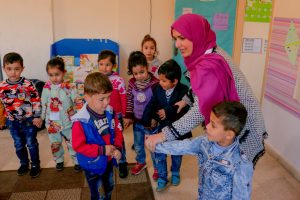Transforming Education Through Play
Carole Fakhreddine is Seenaryo’s Playkit Project Manager, based in Beirut. She has a background in inclusive education and is a firm believer in every child’s right to learn – regardless of their abilities or disabilities.
A play-based approach to education is increasingly being recognised as one of the most effective ways to engage early years learners, including children with disabilities. In an inclusive classroom with a play-based methodology, every child – regardless of ability, disability, or background – plays together and has equal opportunities to learn through play.
In Lebanon, we are slowly starting to change our approach to learning, but we still have a long way to go.
Growing up in Lebanon, my experience of education was very traditional. The teacher would stand in front of the class, writing on the board. I never felt like I could keep up with my classmates and needed extra support throughout school. When I began working in nurseries and early years classrooms myself, I realised that one way of teaching doesn’t suit everyone. I became fascinated by an inclusive approach to education, and have been working in the field ever since.
In Lebanon, we are slowly starting to change our approach to learning, but we still have a long way to go. Education isn’t a priority in this country – schools are underfunded and teachers are underpaid, with Lebanese public schools barely open last year due to teacher strikes over pay. This has a particularly severe effect on children with disabilities. They have no legal protections and many of their families have been deeply affected by overlapping crises in Lebanon, meaning they simply cannot afford to send their children to school.

At Seenaryo, we believe that play-based learning can create child-centred and participatory classrooms – making them inclusive for all early years learners. We have identified several ways that a play-based approach can foster inclusion in early childhood education:
Play motivates and engages every child in the classroom. Children with disabilities are often more motivated to participate in play-based activities than in traditional sit-down lessons, as a child-centred and play-based learning environment is flexible and can be adjusted to suit every child’s learning style.
Play supports development across different areas. Play is a holistic way to support a child’s overall development at a critical time for their brain’s development. Whilst playing, children develop language, cognitive, social, emotional and physical skills.
Play facilitates relationship-building between children. Collaborative play activities – such as drama exercises and building blocks together – facilitate positive interactions between children, as well as offering valuable opportunities for children with disabilities to engage with their peers. An inclusive dynamic fosters empathy and creates a more compassionate and understanding community.
To successfully adopt a play-based approach, teachers need time and support to thoughtfully plan their lessons – paying special attention to representing diversity in their teaching materials as well as arranging the learning environment in a way that enables full participation. When implemented well, play-based learning can transform the classroom, creating an inclusive and child-centred classroom that engages everyone in the room.
